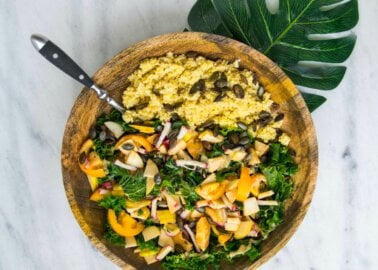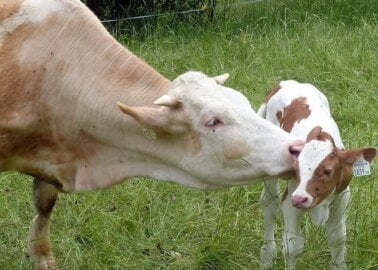2020 Ties for Hottest Year on Record
Despite the unprecedented decrease in human activity caused by the COVID-19 pandemic and a 7% fall in fossil fuel burning, 2020 has now matched 2016 as the hottest year on record.

In 2020, the world saw devastating wildfires across Australia and the Arctic, deadly floods and heavy rain, and overwhelming tropical storms. The data are clear: whether we’re in lockdown or not, we will continue to see the long-term consequences of the climate crisis unless we change our behaviour.
We must make meaningful changes, or the situation will only get worse. The fishing, meat, dairy, and egg industries are not only relentlessly cruel to animals but also a nightmare for the environment.
Here’s why you can’t claim to be an environmentalist and be a meat-eater:
Eating Meat Fuels the Climate Crisis
According to the United Nations, animal agriculture is responsible for a greater proportion of greenhouse-gas emissions than all forms of transportation combined.
The UN also states that raising animals for food is “one of the top two or three most significant contributors to the most serious environmental problems, at every scale from local to global”. The situation is so dire that the UN is calling for urgent and unprecedented changes now, including to our diet, to limit the catastrophic damage caused by climate change.
Researchers at the University of Oxford found that going vegan could reduce our carbon footprint from food by up to 73%, resulting in a significant drop in greenhouse-gas emissions.
The study’s lead author, Joseph Poore, states the following:
Scientists agree that all plant-based foods have a smaller carbon footprint than their animal-derived equivalents, so the easiest way to slow down climate change immediately is to go vegan.
Life on Earth
Exploiting animals for their milk, flesh, and eggs is pushing our natural environment and life on Earth to its limits. WWF’s Living Planet Report 2020 states that 68% of wild-animal populations have been lost since the 1970s.

Habitat loss is the main cause of extinction. In the UK, the RSPB reports that 26% of mammal species are at risk of extinction and 43% of bird species have declined, while almost half of the farmland is used for grazing animals like sheep and cows, at the expense of nature.
Despite this crisis, humans are still razing some of the most species-rich areas on Earth – including rainforests in South America – in order to graze cows or grow soya that is fed to cows, chickens, sheep, and pigs. One-third of the Earth’s land surface is used for animal agriculture, but if we all stopped eating meat and dairy, global farmland use could be reduced by 75%.
Water Footprint
As if violence towards animals and environmental destruction weren’t enough, animal agriculture also has a shocking water footprint. Meat-eaters are responsible, on average, for the use of 15,000 litres of water a day.

While it takes about 1,790 litres of water to grow 1 kilogram of wheat, you’d need to use more than five times more water for 1 kilogram of beef. It takes the equivalent of 50 bathtubs full of water to produce just one steak.
It’s not only meat production that wastes water, either. It takes 72% more water to produce a litre of cows’ milk than it does to produce the same amount of soya milk.
Using this much water unnecessarily at such an alarming rate harms the planet and us, but going vegan drastically changes the numbers. By eating plant-based, we reduce our water footprint by nearly 60%.
Fact Box
- Globally, the 13 biggest dairy companies combined are responsible for the same amount of greenhouse-gas emissions as the entire UK.
- The carbon footprint of bacon is 11 times larger than that of THIS Isn’t Bacon (a popular variety of vegan bacon).
- The carbon footprint of beef from UK-raised cows is 38 times larger than that of avocados from South America. The carbon footprint of beef is 48 times larger than that of beetroot.
- The carbon footprint of lamb is 23 times larger than that of tofu.
- The carbon footprint of cheese is eight times larger than that of chickpeas.
- Growing plant-based protein requires 20 times less land – and vegetables 50 times less land – than rearing cows for the same serving size of beef.
- A German study found that the climate cost of meat that comes from animals reared on organic farms is similar to that of meat from animals reared in intensive factory farms, so the best option for the climate – and animals – is to go vegan.
What You Can Do for Animals and the Environment
We can decry the devastation wreaked by the climate crisis all day long, but as long as people have meat in their mouths, they might as well whistle into the wind.
For help getting started, take our 30-day vegan pledge to receive tips and advice for every part of your journey.



